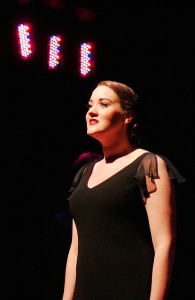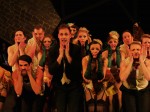Jamie James as the Emcee, centre, with the ensemble of Cabaret. (photo by Kristian Guilfoyle)
Many know the title song from the musical Cabaret. You can hum it. “Life is a cabaret,” it tells us, but it is not a celebration of life. Rather, for those who know the play or have seen the film, it is a desperate plea for delusion. Sally Bowles denies the obvious, that Berlin is changing under Nazi influence. Weimar Germany is dying, but she refuses to see it. What will happen to her, we can only guess.
The new stage production by Pipedream Theatre Project, a community musical theatre company, is an opportunity to see John Kander’s and Fred Ebb’s (Chicago, Kiss of the Spider Woman) first Broadway hit, back in 1966. The stage version is quite different from the film, which is interesting in itself. Many songs and plot elements were cut or altered for the 1972 film starring Liza Minnelli.
The main story follows Cliff (Victor Hunter), a young American would-be writer who comes to Berlin to experience life and write a novel. He meets the British Sally Bowles (Rebecca Friesen), a performer at the notorious Kit Kat Club, and an affair ensues. She is pregnant. What will they do? A subplot involves the middle-aged Jewish shopkeeper, Herr Schultz (David Wallace), who falls in love with his landlady. Though he’s the victim of humiliations by Nazi supporters, he refuses to believe life will ever get too difficult for the Jews. After all, he tells friends, he too is a German. We can only anticipate his future with fear.

(photo by Kristian Guilfoyle)
In a sense, though, the story is secondary to the cabaret performances that fill and frame the drama. The Emcee (Jamie James), played in the film by Joel Grey, welcomes us with the well-known “Wilkomen.” Here he establishes his relationship with the audience: we are part of the audience of the licentious Kit Kat Club. The Emcee’s performances throughout the play will draw our attention away from the main story just as the characters’ love of illusion keeps them from seeing reality. The use of cabaret performances, interspersed with dramatic scenes, is the show’s greatest strength.
But the audience sees everything because we know what the characters cannot: the future. We are entranced by the cabaret performances, including the songs, “Two Ladies,” “Don’t Tell Mama” and “Mein Herr.” In fact, the women’s chorus, the Kit Kat Girls, is the strongest musical element of this production. Their group performances are alive, their combined voices loud, clear and melodic. As an audience, we also know how life will turn out for these naïve characters: the homosexuals especially. Weimar freedom will be countered with a brutal backlash.
The good men’s chorus performs the frightening song “Tomorrow Belongs to Me” well. The singers provide the appropriate tone shift mid-song that changes an upbeat ode to a bright future into an angry group anthem that dreams of cruelty and destruction.
The show’s best voice belongs to Stephanie Liatopoulosas, as the prostitute Fraulein Kost, when she leads the reprise of “Tomorrow Belongs to Me.”
Director April Green has chosen to make her emcee clearly heterosexual and more goofy than sinister. The style does not work for this character. The Emcee at the Kit Kat Club needs to be somehow creepy and transgressive in order to represent the kind of “decadent” behavior the Nazis wanted to destroy, so this characterization is too light for the role. The Kit Kat Girls’ dancing could have come from Guys and Dolls or West Side Story. It just isn’t very dirty.
One song that was problematic in the play’s first production back in the ’60s is problematic here. “If You Could See Her” is performed by the Emcee and a person dressed as a gorilla. This production has no gorilla costume, just a hairy man wearing a dress and some black makeup. The joke is that “if you could see her through my eyes” you would also love her. Beauty is in the eye of the beholder. But the final line of the song, almost whispered, goes: “If you could see her through my eyes, she wouldn’t look Jewish at all.” The point of this lyric is to disgust the audience with the Emcee’s antisemitism. During the musical’s first production, many audience members believed the whole song antisemitic and called for its cut. The word “Jewish” was removed from the original production and replaced with “meeskite,” or ugly. Subsequent productions have occasionally used the word “Jewish” instead. In the case of this production, the problematic word “Jewish” does not work. Because the Emcee is played as fresh and friendly, and the other performer is not in a gorilla costume, the song’s intention disappears. Rather than suggesting Jews are animals, and hoping the audience cringes, this version suggests Jews look like ugly women.
I suspect the production could not get a gorilla suit and figured the audience would know the character was an animal by the blackened face (not blackface, I hasten to add), and the fact that she likes eating a banana. The choice fails the taste test. This production should have used the word “meeskite,” as in the film and in many productions. In the absence of a gorilla costume, the song should have been cut entirely.
Pipedreams is now 10 years old and is dedicated to presenting infrequently produced musicals and providing opportunities to young musical talent. Last year’s production, Assassins, was nominated for an Ovations Award, a Vancouver version of the Tony Awards for musical theatre. Previous productions have included Nine (2010) and little-known works like Elegies: A Song Cycle (2011) and Adding Machine (2011). Cabaret is at Performance Works on Granville Island until April 19. Tickets vancouvertix.com.
Michael Groberman is a Vancouver freelance writer.

